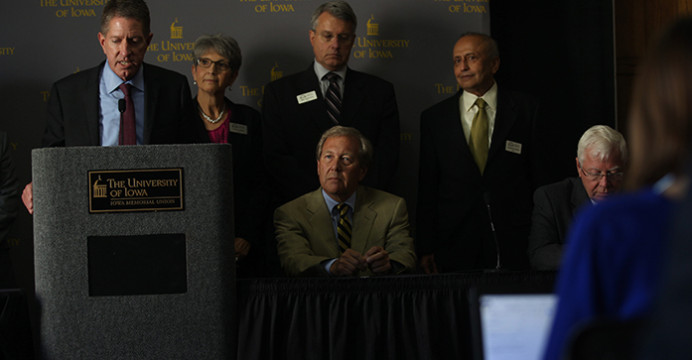Hannah Soyer
The state Board of Regents met Wednesday and will meet again today to elect the board president and president pro tem. Current President Bruce Rastetter and President Pro Tem Katie Mulholland seek re-election, although it is necessary for the regents to elect a new president.
Specifically, the regents should elect one of the regents who did not have a part in meeting with Bruce Harreld individually before all the regents selected him: Sherry Bates, Patricia Cownie, Rachael Johnson, or Subhash Suhai.
RELATED: Rethink pay-to-ride school busing
Rastetter, a self-made millionaire, gave more than $160,000 to Gov. Terry Branstad’s 2010 campaign. The following year, Branstad appointed him to the regents. According to Politico, Rastetter was the biggest GOP donor in Iowa, as of March of last year, and has also earned the nickname as “kingmaker,” in response to his tendency to back candidates in various campaigns who end up winning, as it was with UI President Harreld.
Clearly, Rastetter has political clout, and it doesn’t seem too far off to draw the conclusion that this is due to his wealth. Whether this sort of player is appropriate for working with a government whose role is to serve its people is a discussion for a different column. This is not the sort of person, however, who we want continuing to make decisions that directly affect Iowa’s public universities.
It is noteworthy to remember that previous Regent President Craig Lang was reappointed by Governor Terry Branstad, but Lang was then blocked from being reinstated by the Iowa Senate. Clearly, Rastetter isn’t the beginning of potentially shady dealings occurring between the regents and the governor. And I don’t believe this has anything to do with the party differences between the Democratic Senate and the Republican governor and regent president. Backroom political deals can and have happened with both parties, and laying blame on one or the other isn’t going to solve the problem of having the state’s public universities run by people who are more concerned with making a profit and running a business than furthering higher education.
For example, in 2011, Rastetter pushed for a partnership between Iowa State University and AgriSol, one of his companies, to turn up to 800,000 acres of land in Tanzania into land for grain and livestock. Experts warned against doing this, because it would disenfranchise the area’s local farmers. Rastetter, however, would have made a large profit from the project through his company. Whom the project was meant to serve besides him is up for question. Either way, his actions in this matter violated the regents’ conflict-of-interest policy.
Rastetter has been either the president pro tem or president since 2011. His actions have been more destructive than beneficial to the principles of higher education, and it’s the regents’ responsibility to recognize this and not re-elect him. It’s time for a new voice to lead the regents — who do, indeed, run public higher education in Iowa — a voice that can lead the state’s public universities to a better future instead of holding them back.



